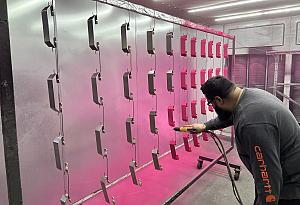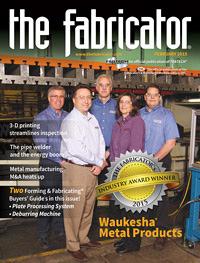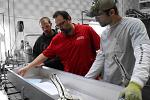- FMA
- The Fabricator
- FABTECH
- Canadian Metalworking
Categories
- Additive Manufacturing
- Aluminum Welding
- Arc Welding
- Assembly and Joining
- Automation and Robotics
- Bending and Forming
- Consumables
- Cutting and Weld Prep
- Electric Vehicles
- En Español
- Finishing
- Hydroforming
- Laser Cutting
- Laser Welding
- Machining
- Manufacturing Software
- Materials Handling
- Metals/Materials
- Oxyfuel Cutting
- Plasma Cutting
- Power Tools
- Punching and Other Holemaking
- Roll Forming
- Safety
- Sawing
- Shearing
- Shop Management
- Testing and Measuring
- Tube and Pipe Fabrication
- Tube and Pipe Production
- Waterjet Cutting
Industry Directory
Webcasts
Podcasts
FAB 40
Advertise
Subscribe
Account Login
Search
The hiring question in metal fabrication: Experience or potential?
A logical look at a modern challenge
- By Dick Kallage
- January 28, 2015
- Article
- Shop Management
One of the great challenges facing skills-based manufacturers and especially metalworking shops is finding the talent necessary to both accommodate growing demand and to replace a large number of highly skilled workers who are nearing retirement. This theme seems to pervade the industrial sectors of North America.
Companies large and small are bemoaning the stark fact that we seem to have an acute shortage of experienced people who can fill vacancies created by growth, retirement, or both. The fact that this was one of the few things that was predicted accurately several decades ago is irrelevant now—except possibly as a “learning event.”
Of course, in the great American way, we spend a lot of time assigning blame. Just about every institution has been hammered for the absurd situation of having many hundreds of thousands of decent-paying jobs remaining unfilled while millions remain unemployed or underemployed. There is a lot of blame to go around—the education system, government, media, you name it. But we know who the ultimate culprit is: industry itself. We got ourselves into this mess, and in my humble opinion, we’re the only ones who will get us out of it. Others may help, but it’s on us.
In a recent column I opened the topic of where we are going to find the talent we need, and I will return to that topic this year in another column. In this column I want to address a “right now,” ground-zero issue: Whom do I hire this year and next? Should that person have all of the proven qualifications and experience, or be a rookie with a lot of potential?
Certain arguments support either position, or even both positions simultaneously. Unfortunately, one of the most common arguments is based as much on emotion as it is on logic and economics. I’d like to strip away the emotional and hand-waving parts and examine the facts.
Hiring Experience
The case for hiring experience is obvious: You get a person who right away can demonstrably and competently perform needed tasks. It’s a strong argument that suits the “short-term-itis” mentality that got us into this situation in the first place. The downside is also obvious: This talent is now and will continue to be rare and expensive. To hire this person, you will have to bid against others with the same “short-term-itis” mentality.
There is also a less obvious downside: With the skills and years of experience comes inevitable baggage—some harmless, some not so much. Highly experienced people often resist change. What they have done and the methods they have learned in the past represent the way to do things. This is a serious flaw in an environment where change in technology and methodology has become a way of life.
Hiring Potential
The case for hiring potential basically is the opposite of the downsides for hiring experience: People with potential talent are less expensive and can be more readily molded to the company’s culture. Further, since they have little if any “experience” baggage, they presumably can adapt to needed change. High-potential talent is scarce, but not nearly as scarce as experienced talent. Plus, you are not bidding for this potential against everyone else. Everyone can recognize experience, but not everyone can spot potential.
The arguments against hiring potential talent are also simple: You have to train and develop these people, adding to their overall cost. And for a while, at least, they will be less productive than experienced people.
The Common Nonargument
There is another argument against hiring high-potential rookies that is the most common objection I hear—and it’s highly questionable. It goes along this line: “I’ll hire this kid, nurture and train him, spend tons in training costs and lost productivity, and as soon as he’s fully trained, he’ll leave for more money.”
A lot is wrong with this argument. It blames the person who leaves because the company does not offer competitive wages and benefits; or because the person is blocked from earning more; or he or she is working in an environment that is stifling, dangerous, or just generally sucks.
It begs the question: Why would you hire someone who would put up with this? You actually should be hiring and developing people everyone wants, those who are constantly courted to leave. Why in hell would you employ someone nobody else wants? Your job is to know this, accept it, and do what’s necessary to keep that person.
Having said that, it is inevitable that some will leave no matter what you do. This is one of the prices of excellence. Here’s another counter to the “they’ll leave” argument: Experienced people for whom you paid a lot also leave, and sometimes for the same reasons that the high-potential people leave. But in my experience, they are more likely to leave simply for money.
This is the third flaw in hiring experience, and you already have proof of it: These people left another company to come to yours, usually for more money. Yet another counter is that the training and productivity costs cited as a reason not to hire potential talent are almost always overstated, tainted by emotion. Compared to the one-time and ongoing expense of hiring an experienced person, such costs are usually a wash.
The last counter to the notion that hiring inexperience is expensive or less desirable is the reason that the argument even exists: You really don’t have a choice. There are not enough experienced people to go around.
One of the initiatives being launched is a tweak of the education system to produce more people with the skills to be productive immediately. I applaud that, but it won’t solve much for years. The cupboard is pretty bare. Plus, as I can directly attest to, the education system is like the War College. Just as future generals are perfectly trained to win the last war, students are trained, necessarily, on yesterday’s skills. Schools can only follow, and we should be thankful if they do at least that! It will be a lot better than what we have been doing. But it’s very late and not nearly enough.
Training the Inexperienced
So the question ultimately revolves around this: How do you hire, train, nurture, and retain high-potential people with little or no experience? First, you must define the characteristics of the employee you need. Second, you must have a way of finding this person. Third, you must be able to assess him or her relative to the desired characteristics. Fourth, you must have a method of converting the potential to actual performance while still nurturing potential talent. And finally, you must foster an environment that will tend to retain a critical number of these high-potential people you intend to hire.
Great companies are absolutely excellent at this process, and I will devote a column to detailing some common practices. For now I’ll just say that it’s not purely a cookbook affair. Some of it requires judgment and intuition, just like the process of business itself, but certain steps can be enumerated and even standardized.
Final Thoughts
I compare today’s manufacturing environment to the ongoing situation in professional sports. Talent is truly scarce. Experienced talent costs a fortune, and acquiring it in no way guarantees success. In fact, sometimes it guarantees expensive failure. The teams that are great year in and out often develop their own talent, and I believe the same is true in our business.
Exceptions exist, of course. If you need experienced people right now, you have no choice but to pay whatever you need to hire them. But this should be the exception. Otherwise, developing your own talent is the way to go.
About the Author

Dick Kallage
Related Companies
subscribe now

The Fabricator is North America's leading magazine for the metal forming and fabricating industry. The magazine delivers the news, technical articles, and case histories that enable fabricators to do their jobs more efficiently. The Fabricator has served the industry since 1970.
start your free subscription- Stay connected from anywhere

Easily access valuable industry resources now with full access to the digital edition of The Fabricator.

Easily access valuable industry resources now with full access to the digital edition of The Welder.

Easily access valuable industry resources now with full access to the digital edition of The Tube and Pipe Journal.
- Podcasting
- Podcast:
- The Fabricator Podcast
- Published:
- 04/09/2024
- Running Time:
- 63:55
In this podcast episode, Brian Steel, CEO of Cadrex Manufacturing, discusses the challenges of acquiring, merging, and integrating...
- Industry Events
16th Annual Safety Conference
- April 30 - May 1, 2024
- Elgin,
Pipe and Tube Conference
- May 21 - 22, 2024
- Omaha, NE
World-Class Roll Forming Workshop
- June 5 - 6, 2024
- Louisville, KY
Advanced Laser Application Workshop
- June 25 - 27, 2024
- Novi, MI































